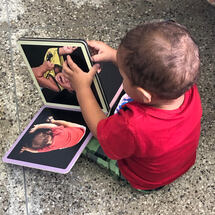 This randomized controlled trial (RCT) assessed the impact of a parent-child reading program called Universidade do Bebê (UBB), on parenting and child cognitive-linguistic and socioemotional outcomes. UBB was developed by Dr. Alan Mendelsohn and his team in collaboration with researchers at Instituto Alfa e Beto in Brazil. It consisted of monthly 1-hour workshops focusing on parent-child reading complemented by a book-lending library. The workshops’ curricula included videos and ‘live’ demonstrations of parents reading together, discussion of the importance of parent-child book reading, and strategies for reading aloud with children. UBB was previously studied in Boa Vista, RO, northern Brazil, with families with children ages 24-48 months, and has shown effects on parenting and child outcomes. In a new study in Arcoverde, PE, northeast Brazil, we sought to determine whether similar results would be found when UBB was provided beginning in pregnancy through early toddlerhood. 400 women, either pregnant or with small children 0–24 months, completed surveys about beliefs about early reading, parenting, reading and playing routines at home, and child development at baseline and again after approximately 11 months, when the program was interrupted due to COVID-19 restrictions. From August 2019 through March 2020, half of these families participated in UBB. Results from the 11-month follow-up in April 2020 were first published in the Journal of Developmental and Behavioral Pediatrics (JDBP). Compared to the families in the control group (who did not receive the intervention), parent-child dyads who participated in UBB showed increased cognitive stimulation and awareness about the importance of early reading than controls, with no differences by parent literacy level and similar findings for women who were pregnant and families with children 0 to 24 months at enrollment. Findings from a second follow-up assessment in October 2020 were published in Nature Pediatric Research and demonstrated sustained impacts of UBB on parenting and parent-child reading 6 months into the pandemic. Remarkably, for families who did not participate in UBB increased COVID-19-related distress was significantly associated with reduced positive parenting and parent-child reading 6 months into the pandemic in, however such negative associations were buffered for the UBB group. Together, findings from both studies indicate that promotion of cognitive stimulation in the home through parent-child reading may be a critical strategy to improve early relational health and child development among vulnerable families, with potential for buffering pandemic-related distress and preventing delays in early child development. Citations:
Families participating in UBB
Comments are closed.
|
AuthorWrite something about yourself. No need to be fancy, just an overview. Archives
June 2024
Categories |
|
PlayReadVIP National Center
at NYU Grossman School of Medicine 462 1st Ave. OBV A524 New York, NY 10016 [email protected] |
